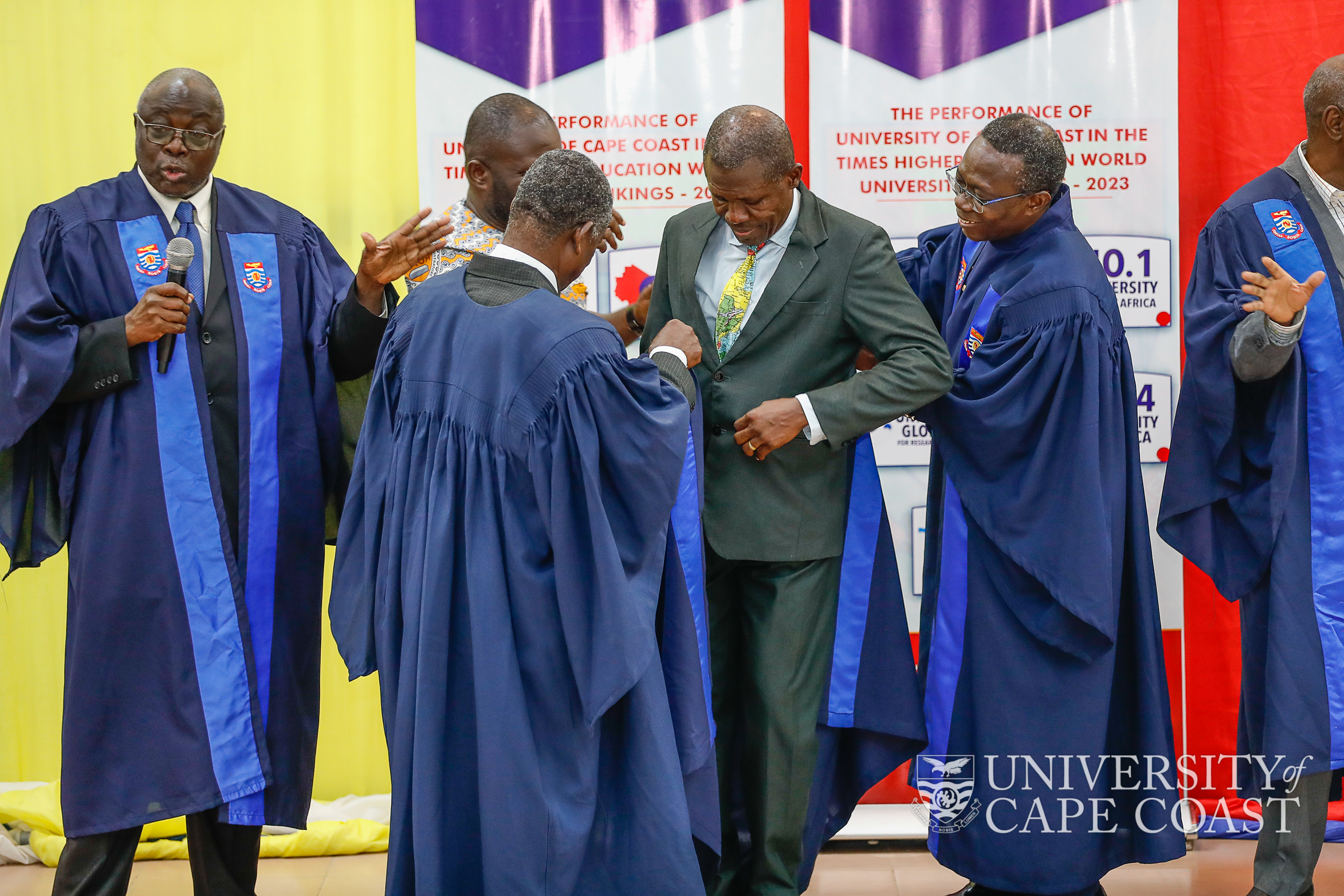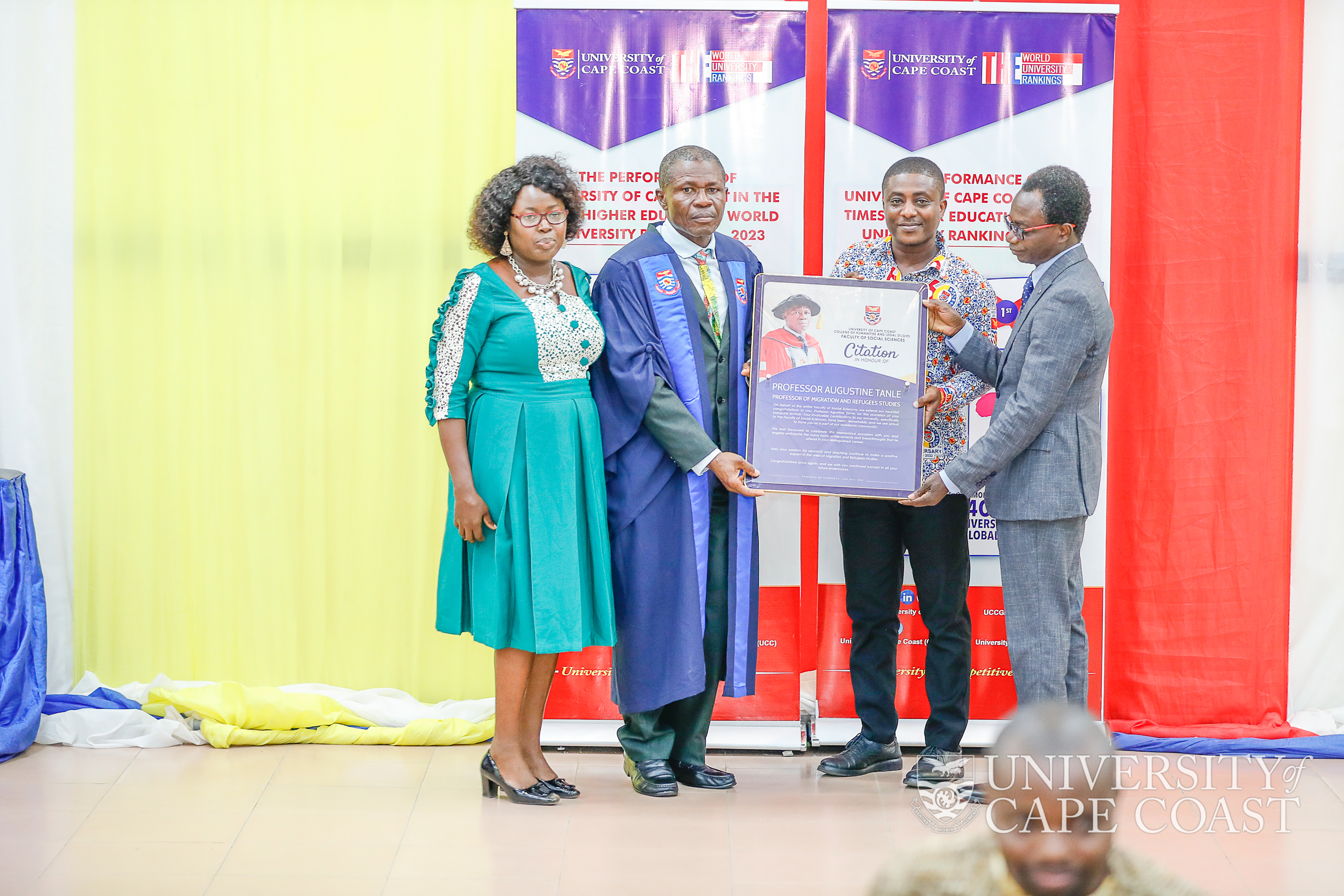Government's flagship programme of Planting for Food and Jobs could partly address north-south seasonal labour migration in Ghana. This is according to a Professor of Migration and Refugees Studies, Prof Augustine Tanle.
According to him, this is achievable “if the necessary infrastructure (irrigation facilities), inputs (fertilizer and relevant chemicals) and technical support are provided devoid of partisanship and political rhetoric”.
He underscored the need for government to facilitate the creation of growth poles in areas such as Wa, Bolgatanga,Tamale, Damongo and Nalerigu, indicating that : " these can serve as development points so that the peripheral areas can be attractive for further development."
Prof. Tanle made the remark at his inaugural lecture which was on the topic: “Interrogating North-South Seasonal Labour Migration in Ghana as a Livelihood Strategy”.
Prof. Tanle being robed by the members of the College of Professors-UCC
He admitted that the main drivers of north-south seasonal labour migration from northern Ghana were widespread poverty, poor physical characteristics and differences in socio-economic opportunities and infrastructural development between the northern and southern Ghana.
Prof. Tanle, who is also the Vice-Dean of the Faculty of Social Science, University of Cape Coast, appealed to government to make conscious efforts to expand socio-economic opportunities and infrastructural development in northern Ghana.
He expressed the hope that such opportunities and facilities could create the enabling environment for investment, motivate individual or group enterprises in both agriculture and non-agriculture enterprises.
That, he said, could create job opportunities for people who, otherwise, would have migrated to southern Ghana where opportunities for their services had now dwindled.
Prof. Tanle receiving a citation from the Faculty of Social Sciences – UCC
He expressed the belief that Ghana was not likely to achieve the Sustainanable Development Goals 1,2,4,6 and 10, which deal with poverty, hunger, quality education, clean water and sanitation, and reduced inequalities, respectively, owing to the widespread spatial inequalities in socio-economic development between northern and southern Ghana.
Prof. Tanle, therefore, passionately appealed to government to channel its development policies to the northern part of the country to bridge the yawning gap between the north and south.
Prof. Augustine Tanle: 17 Quick Facts
- Started primary school at Sunyani Urban Council but due to the death of his father in 1976, he completed Middle School in 1976 at the Tome Local Authority at Nandom-Tome.
- Attended Bole Secondary School in 1980.
- Completed his G.C.E Ordinary Level in 1985 and proceeded to Nandom Secondary School from 1985 to 1987 for his G.C.E Advanced Level.
- Gained admission into UCC in 1990 where he obtained his B.A. Social Sciences (Geography Major) and Diploma in Education in 1994.
- Taught at the Ola Girls' Secondary School, Kenyasi, in the Asutifi South District from 1994-1999.
- Proceeded to UCC again for his Master of Philosophy programme and completed in 2003.
- Appointed as lecturer at UCC in July 2004.
- Enrolled in a PhD programme at UCC in 2005 and completed his PhD in 2010.
- Promoted to the rank of Senior Lecturer in October 2009 in the course of his PhD programme.
- Promoted to the rank of Associate Professor in April 2014
- Appointed Head of Department of Population and Health (2014-2019)
- Promoted to the rank of Professor of Migration and Refugees Studies in August 2018
- Has to his credit 48 articles published in reputable journals, three book chapters and three research/technical reports.
- Currently on his second term as the Vice-Dean of the Faculty of Social Sciences
- Devout Catholic
- Married to Mrs. Angelina Tanle, with two children
Source: Documentation and Information Section-UCC



